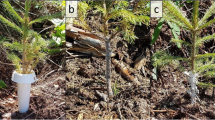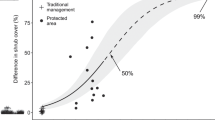Abstract
SUGGESTIONS have been made1 that by the addition of wetting agents an economy can be achieved in the use of water in fire fighting, particularly with heath and undergrowth fires. Preliminary experiments which we have recently completed indicate some of the probable limitations of this proposal, and also suggest fields in which it might have some practical use. The combustible materials used were ling (Calluna vulgaris), bracken (Pteridium aquilinum) and purple moor grass (Molinia cærulea) ; the samples were provided by the Forestry Commission at the end of the winter and after a long dry spell, so that they were in their most dangerous condition from the point of view of the forest fire-fighter.
This is a preview of subscription content, access via your institution
Access options
Subscribe to this journal
Receive 51 print issues and online access
$199.00 per year
only $3.90 per issue
Buy this article
- Purchase on Springer Link
- Instant access to full article PDF
Prices may be subject to local taxes which are calculated during checkout
Similar content being viewed by others
References
For example, Edson and Parker, Fire Engineering (August, 1947)
Author information
Authors and Affiliations
Rights and permissions
About this article
Cite this article
FRY, J., SMART, P. Use of Wetting Agents against Heath and Undergrowth Fires. Nature 163, 844–845 (1949). https://doi.org/10.1038/163844a0
Issue Date:
DOI: https://doi.org/10.1038/163844a0
Comments
By submitting a comment you agree to abide by our Terms and Community Guidelines. If you find something abusive or that does not comply with our terms or guidelines please flag it as inappropriate.



